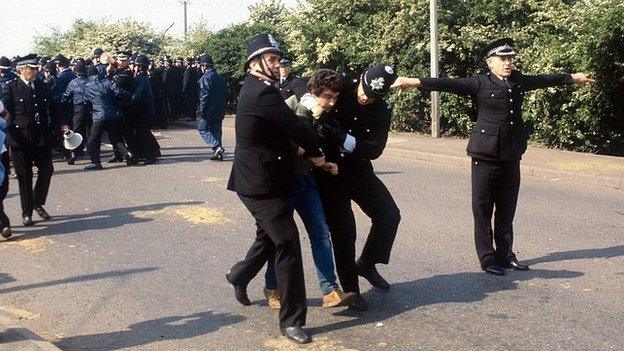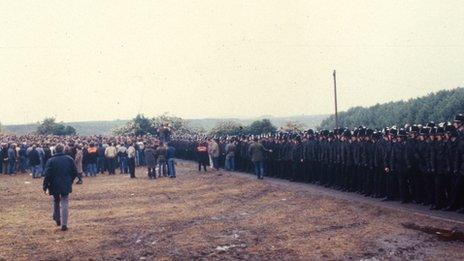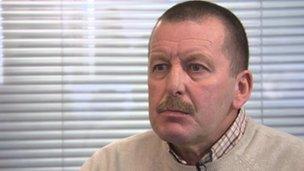'Battle of Orgreave': Miners and police remember
- Published

More than 90 people were arrested and both miners and police officers were injured in the clashes
Almost 30 years ago, 10,000 striking miners clashed with 5,000 police officers in what became known as the Battle of Orgreave.
With the Independent Police Complaints Commission (IPCC) asking police forces to search their archives for notes about the event, what memories do those who were there have of what happened on 18 June 1984?
Three months into their strike over pit closures, miners gathered outside Orgreave coking plant near Sheffield for their largest picket so far.
A confrontation with police ensued and dozens of people, both miners and officers, were injured. The clashes led to more than 90 people being arrested.
The police operation on the day involved officers from forces around the country, who were drafted in to help handle the pickets.
South Yorkshire Police referred itself to the IPCC in 2012 after claims in a BBC documentary that some officers may have colluded in writing court statements.
For many of the miners, an IPCC investigation does not go far enough and a public inquiry should be launched.
For those who were there, memories are vivid of the events of the day - memories of the violence, of the conduct of the miners and the officers, and of the aftermath.
'Incredible scenes'
Chris Skidmore was a 22-year-old miner from the Bullcliffe Wood pit in West Yorkshire when he arrived at Orgreave.
He said it was "an unusual day because usually the police would try and stop people heading to the picket".
"But that day they were happy to wave everybody through and even showed them where to park.

Mr Skidmore said the day was "more like something from the Civil War"
"Everybody in our surrounding area worked at the pit, so you could imagine the amount of people heading to Orgreave."
He said the scenes were "incredible, it was more like something from the Civil War".
"At the top of the hill were the miners from the north of England and Scotland, and down the bottom were ones from the south.
"In-between were the police."
Arthur Scargill, leader of the National Union of Miners (NUM), had called on miners to picket the plant to try and stop British Steel's coke convoys.
Hundreds of police formed lines around the miners to try to stop them getting to the coke lorries.
Speaking on the day of the clash, the chief constable of South Yorkshire Police at the time, Peter Wright, said the police action had been "gauged to match the reaction of the pickets".
"The numbers of police officers there has been increased as the number of pickets increased and any police reaction was to something the miner pickets were doing."
'Bricks flying'
Mr Skidmore, who is now the chairman of the NUM's Yorkshire branch, said officers had "pulled some of the miners out of picket".
"We could see they weren't just frogmarched off - they were being beaten up. That inflamed the situation.
"The officers then broke their ranks and the horses charged.
"It was terrifying having several tonnes of beast galloping at you with a man on top swinging a big stick.
.jpg)
Police used horses to charge at the miners during the picket at Orgreave
"Everybody was running away looking for shelter."
He said he ran to "an ice-cream van, which I tried to get under, but there were already four or five people hiding there who told me to get on my way because there wasn't enough room".
"I remember passing one big lad who was eating an ice-cream, and a copper just smashed his nose in with his baton.
"He was no threat to anyone.
"They had cleared the picket and the lorries could get through, so why were they chasing after everyone?
"It was ferocious - sheer panic."
Speaking to the BBC, external, former police officer John Vipond said the hot day led to cans of drink being given to officers.
"Just as you heard the click of the cans, the miners kicked off," he said.
"They started to throw things at us and we had to put these cans down and stand shoulder to shoulder.
"It became rather nasty after that, with surges back and forward."
He said there were "bricks flying and people going down".
"One or two bricks were thrown back from the police into their end."
Riot charges
Those arrested at Orgreave were held for a variety of offences, with several being put on trial for rioting.
The trial collapsed after 16 weeks when it became clear police evidence was unreliable.

Arthur Critchlow was hit with a baton and arrested during the clash
One of the defendants, Arthur Critchlow, said he was "arrested, badly injured by two police officers with truncheons, then remanded and charged with unlawful and riotous assembly, which carried a life sentence".
"We went on trial for 48 days at Sheffield Crown Court.
"During the whole 48 days, I totally believed that the state could do what they wanted.
"No one has ever been held to account for the grave miscarriages of justice that happened on that day."
Mr Skidmore said the anger felt by Mr Critchlow was not unique and that many of those who were at Orgreave still harboured strong feelings.
"All we could see was that a way of life was going to disappear," he said.
"It still resonates to this day - there are some people who don't talk to others, because they scabbed and others who don't even speak to some family members."
South Yorkshire Police was contacted by the BBC but did not supply a comment.
- Published14 November 2013
- Published22 May 2013
- Published8 April 2013
- Published13 September 2012